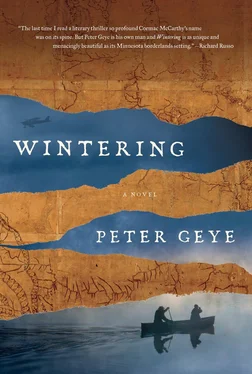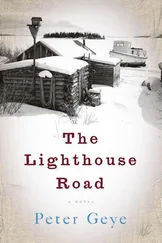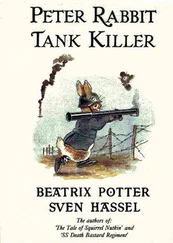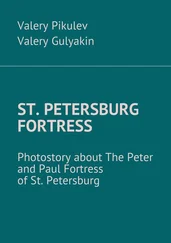“We aren’t short on rice,” Gus said. And they weren’t. Rice and oats and buckwheat they’d packed in. Dried fruit. A sack of onions and another sack of potatoes. Sugar. Ten pounds each of oleo, salt, and coffee. Four jars of peanut butter. Six tins of crackers. Chocolate bars. More than a hundred pounds of food split into two packs. They’d hunt and fish for the rest of their provisions.
“There’s a spot,” Harry said, pointing now to a moon-shaped beach of granite in the shadow of the white pines.
When they went ashore, Gus said, “I didn’t think we’d ever see this much open ground again.” A dozen towering pines were scattered across what was otherwise a clearing the size of a highway intersection. In contrast to recent campsites, this was a royal find. They wandered from tree to tree, looking up at the canopy of heavy boughs as though at a cathedral ceiling.
“We’ll have no trouble finding a place to raise our tent here, eh, bud?”
“I guess not.”
Harry looked out over the lake for a clear view of the sky. “We have half an hour of light left. You collect firewood, I’ll get the tent up?”
“Sure.”
Gus took the hatchet from the pack and walked along the perimeter, gathering fallen branches, the wood in such abundance that he felt like a thief. He brought the first armful to a spot between two trees eight feet apart, giving them both a place to rest their backs while they sat fireside. He kicked the duff clear, exposing a natural bowl in the granite, and piled the firewood beside it. He collected another several armloads and built a fire.
Harry joined him beside the flames after the tent was up. “It’s my turn to make dinner, isn’t it?”
“I can eat jerky.”
“Instead of steak and potatoes.”
Gus smiled.
“Naw, go catch us a fish to fry up,” Harry said. “I’ll get a pot of rice going.”
Gus went straightaway to the canoe, untied his rod from the thwarts, grabbed his tackle box, and stepped down to the shoreline. He tied a spinner onto his line and studied the falling darkness. Already there were stars flickering into view. He could hear the fire crack behind him.
But for the expanse of the water before him, casting into those stars shining off the surface seemed not so different than fishing the lakes he frequented around Gunflint. He wished he had a bucket of minnows and the right jig, for there surely were walleyes out on the ledge he’d noticed as they peeled their canoes ashore. But he’d have to make do and hope the spinner worked.
After five minutes his father came down to the shore and waded into the water to fill their pot. “Thought you’d have three lunkers by now,” he said, squinting up and down the shore. “What are you using?”
“A spinner,” Gus said, and cast again.
“Throw a Rapala right off the end of that log.” He pointed to their left and turned back to camp. “A silver one.”
Gus waited for him to reach the fire, then bit the spinner from his line and took a Rapala from the tackle box, tied it on his line, and cast it up the shore. The lure landed only feet from the log. He kept the tip of the rod extended as far offshore as he could. Before he’d reeled it halfway home there was a strike. He set the hook and stepped waist-deep into water to fight the fish, holding his rod high above his head. After a couple runs he landed the fish by its gills, a pike as long as his forearm even as its tail curled up into a beautiful J.
—
They ate fish and rice, scrubbed the pots and plates when they were finished, and sat in the fire’s warmth, drinking coffee, an hour later.
“I lost my compass,” Gus said.
Harry took a sip of his coffee. “You did?”
“Way back on that river. When I went under.”
“What good have our compasses been anyway?”
Gus reached for the coffeepot and refilled his cup, then stood and walked around the fire to refill his father’s. “I don’t understand, Dad.”
“You don’t understand what?”
“Whatever the hell’s happened.”
“Well, we’ve gotten in up to our necks. That’s what’s happened.”
“Obviously. I’m wondering what we’re going to do about it.” He went back to his side of the fire and sat down against the tree. “We should’ve turned around when you said to.”
“Nope. Not true at all. I was a coward for saying that.” Harry sat up. “When the sun comes up, I’ll make a good, long study of the maps. This lake here is enormous. The biggest we’ve been on since Kaseiganagah. It shouldn’t be impossible to figure out which one it is and work from there.”
“We’ll never find that fort. No chance.”
Harry looked at him for a long time with what Gus thought was maybe regret or apology. He’d felt that same expression settle over his own face hundreds of times over the years, trying to convey to Sarah or their children the depth of his feelings without having the words to express them. But that night, he mistook what was on his father’s face for irritation. “What?” he said.
“You’ve been tremendous up here, bud. You kept us going when I wanted to quit. I had no idea you were so strong. That you could work so hard. If we keep it together, we’ll be fine. If we don’t find the fort, we’ll find another place to winter. Hell, we’ll build a wigwam if it comes to that.”
“A wigwam?”
“Sure, as a last resort. I only mean to say we’ll be okay.”
“A wigwam,” Gus said. “Wigwam.” Having nothing more to say, he moved toward the tent.
Harry, speaking to himself, said, “I’ll be to bed soon myself.”
—
He woke in the middle of the night. He searched the darkness for his father but realized he was alone. He watched the fire’s shadow dancing on the canvas, then fell back to sleep and woke again, hours later, to Harry’s snoring, so he unzipped his sleeping sack, pulled on his trousers and boots and sweater, and brushed the tent flap aside.
The world outside was perfectly still. A heavy frost had settled overnight, bleaching everything a brilliant white. The lake was still as glass except for a beaver’s wake along the far shore. It couldn’t have been more than twenty degrees.
Gus walked the shore with the little garden spade and a roll of toilet paper in a coffee can. Thirty paces beyond the canoes, he stopped and set the can on a tree stump, lowered his britches, and squatted, resting his elbow on the stump and watching the beaver across the bay. The thought occurred to him that he was still asleep and dreaming, but an echelon of late-migrating geese came gaggling overhead, and for the first time in days he realized which way was south.
It was then that he saw it: a shack sitting on a knoll among blueberry bushes and deadfall. He cocked his head and rubbed his eyes and looked again. The shack was still there. Cracked windows hung on either side of a door falling from its rusted hinges. A roof of wooden shingles was cloaked in moss, two steps smothered in ferns. The river-rock foundation was held together by ancient mortar, the chimney fashioned of the same materials.
Gus again tried to wipe the sight of it from his eyes. Still it remained. He took a cautious step forward. “Hello?” he called, as if some voyageur might emerge from the collapsing doorway. But no man had crossed that threshold in years. Without taking his eyes from the empty doorway, Gus shouted for his father.
—
Harry pulled the door free. The shanty filled with sunlight and they stepped inside. A mound of husked pinecones sat on the middle of the puncheon floor, but otherwise there was no sign of life. Gus and Harry looked at each other, then slowly poked around the shack.
It was fifteen feet square. Along the southern wall a single bunk not much wider than one of their canoes sat on four birchwood legs. There were two wooden boxes beneath it. On the opposite wall, a small woodstove occupied the hearth and a tin flue rose up the chimney. In lieu of a mantel, three empty shelves hung on the pine-board walls. On the ceiling joists timber planks were stacked neatly. They appeared to be old floorboards. There was no furniture save for the bunk and shelves. The whole place canted toward the water.
Читать дальше












